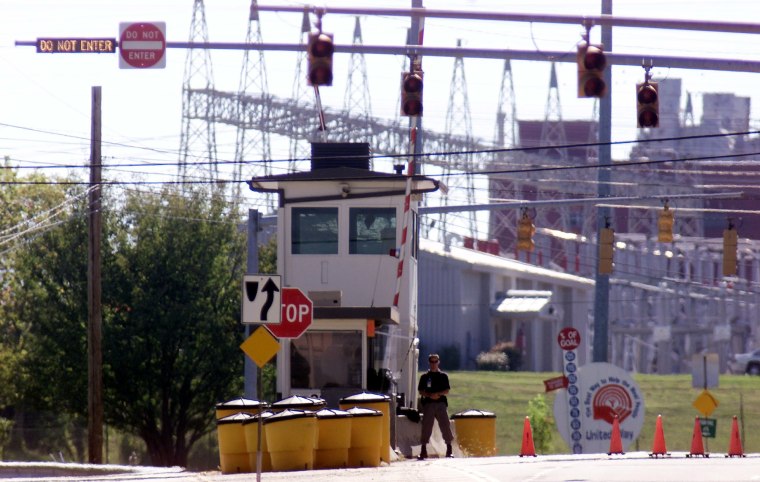Security guards who repelled four simulated terrorist attacks at a Tennessee nuclear weapons plant had been tipped in advance, undermining the encouraging results, the Energy Department’s watchdog office said Monday.
The surprising successes by guards at the Y-12 nuclear weapons plant last summer in Oak Ridge, Tenn., spurred an internal investigation. It determined that at least two guards defending the mock attacks had been allowed to look at computer simulations one day before the attacks.
The Energy Department’s inspector general, Gregory H. Friedman, declared the exercises “tainted and unreliable.” He said each mock attack cost as much as $85,000 to stage, and he urged the department to consider his conclusions when awarding contracting fees for Wackenhut Corp., which employs guards at Oak Ridge. A spokesman for Wackenhut did not return telephone calls Monday to The Associated Press.
A broader investigation uncovered more evidence of cheating during mock attacks against U.S. nuclear plants over the past two decades. Results from such simulations are commonly classified for national security reasons.
The inspector general said guards in another mock attack in late 2000 or early 2001 were improperly told which building would be attacked, the exact number of attackers and where a diversion was being staged. Investigators also said managers substituted their best security guards for others scheduled to work the day of attacks; standby guards would sometimes be armed and used to bolster existing security guards on duty.
In other cases, security guards disabled laser sensors they wore to determine whether they received a simulated gunshot. Guards removed batteries, deliberately installed batteries backward and covered sensors with tape, mud or Vaseline so they wouldn’t operate properly.
Investigators said those claims were based on interviews with current and former guards, which they described as “credible and compelling.” But they acknowledged they could find no documentary evidence to support the claims of previous cheating.
“There’s no point in doing them if you have people who are going to cheat,” said Richard Clarke, a former senior White House counterterrorism official. “That’s ridiculous. It kind of defeats the whole point of having these tests.”
The National Nuclear Security Administration, which protects nuclear plants, said in a letter disclosed Monday that it already has taken unspecified action.
An associate administrator, Michael C. Kane, wrote that if the attack simulations “were in any way compromised so as it skew the quality of information we have about our ability to protect, the results could have extremely significant effects in a way that is entirely unacceptable.”
“We will take all appropriate steps to ensure that is not the case,” Kane wrote.
The inspector general said two guards at Oak Ridge acknowledged looking one day in advance at the computer simulations of the pending mock attacks. The guards denied they did anything differently to prepare, but Friedman said the information would have revealed important details that would tip off the guards about which simulated attack was being launched.
“It’s blatant cheating,” said Peter Stockton of the Project on Government Oversight, a Washington-based watchdog group that has been critical of security at Oak Ridge, about 20 miles west of Knoxville. “It doesn’t say much for the integrity of the guard forces and some managers who knew this kind of thing was going on.”
Computer models had predicted guards at the plant would decisively lose at least two of the four simulated attacks, all on June 23. Two other guards identified as improperly looking at the plans in advance denied doing so, the report said.
The report came just one week after the Oak Ridge plant operators replaced the security manager, Judy Johns. A spokeswoman for BWXT Y-12 L.L.C., which operates the plant, said she could not immediately say whether the transfer was related to the inspector general’s findings. Johns was given a new homeland security assignment and replaced by Willis “Butch” Clements, who previously held the job from 1994 until 1998.
Citing the federal Privacy Act, the inspector general’s report did not identify any of the Oak Ridge guards. Security at the plant is handled by Wackenhut, the largest supplier of guards for U.S. nuclear facilities, including the Nevada Test Site, the Savannah River Site in South Carolina, Colorado’s Rocky Flats Environmental Technology Site and the Nonproliferation and Nuclear Security Institute in Albuquerque, N.M.
